#i'm a language nerd
Explore tagged Tumblr posts
Text
whenever the next tag meme or ask game rolls around that asks for favourite phrase or saying (in English), I always have that one answer I can't remember but really really love so, for posterity
it's "ships in the night"
i love that saying so much, it's so evocative, and depending how you read it it's tragic it's mundane it's intensely creepy it's romantic in a very literary sense, it's so good and i always forget this answer, it's ships in the night. it encapsulates everything i want my writing to be, it's so good
#literature#poetry#it's apparently from a longfellow poem originally so#i'm a language nerd#my life as a hopeless romantic#writing
14 notes
·
View notes
Text
I understand I need a better understanding of how large cities worked in the medieval era for my current D&D setting project, but the research is really not sparking the hyperfixation gerblin that lives in my brain, so it's slow going.
What is sparking my interest is creating weird grammatical rules for the half-dozen fake languages I use for place naming. So instead of learning about logistics in medieval Constantinople, I spent the past hour learning how to make plurals in Greek, and Anglo-Saxon, and Etruscan, and Italian, and German, and Danish, and so on and so on.
If you know me... this was an entirely predictable research rabbit hole.
2 notes
·
View notes
Text
The other day, I was over at my grandparents' place and my grandpa asked me about an English word he'd heard and didn't understand. This is a common occurrence - he didn't learn any English at school, only Russian, but he's always been very interested and he's always looking up words he heard on the radio or saw on ads etc.
So he's like, "I heard this word and I think it's an instrument."
"Oh, sure, what was the word?"
"Hot boys, or something like that."
I blink. "I... haven't heard that before. Are you sure it's an instrument?"
Grandpa: "Yes, I think it could be percussion, like big drums!"
A valid theory! I briefly consider if such a ridiculous name could have really stuck for an orchestra instrument. Meanwhile, my grandfather goes, "well, we'll just have to google it."
I, struck with a sense of immediate Foreboding: "ddddon't-"
He, absent-mindedly while he's *suddenly* operating his laptop at record speed: "Why not?"
At which point I have to look at my 81-year-old conservative raised-by-Silesian-catholic-parents grandfather and say, somehow without laughing: "Because I think it will just turn up gay pornography."
To my surprise, he laughs. He then also still makes me click on the first headline, which obviously is a gay sex club a few towns over.
Long story short, the word was not English. It was French, and it was hautbois. For oboe. So phonetically, he was really, really close actually.






#he's so curious!#it breaks my heart a little to think of how much he would have thrived in a system that had endeavoured to actually teach people languages#instead of just teaching them how to *read* them but ideally never ever *speak* them#anywho i just had to immortalise this episode before i forget it#it was really funny#and i was delighted to find how chill he was about it#i'm a language nerd#english#language learning#foreign languages
354K notes
·
View notes
Text
*taps mic* felix is good at improv because he's skilled in coming up with lies on the spot and adrien is good at faking accents because he's skilled in mimicry and conforming to a set of rules/expectations
#NOT TO SAY FELIX CAN'T MIMIC OF COURSE just that adrien has the languages/accents advantage.#also i just think polyglot/language nerd adrien is a good headcanon. i'm surprised it's not more common#adrien agreste#mlb adrien#miraculous adrien#senticousins#felix fathom#mlb felix#miraculous felix#felix graham de vanily#sentitwins#miraculous lb#miraculous fandom#miraculous ladybug
347 notes
·
View notes
Text
The fact they managed to make BLACK SPEECH sound so gentle and soft while Glûg was asking his orc papa if he loved them...is an achievement!! And the absolute fool of a character that is Adar doing EVERYTHING wrong thinking it's the best and only way, cause he loves them too much.

#the orc storyline is tearing me apart i ain't gonna survive next thursday...#i'm always gonna nerd out about languages ALWAYS#shut it fuku#the rings of power#rings of power#trop#rop#adar
162 notes
·
View notes
Text
I understand that literature nerd Jason Todd is kind of overblown in fanon compared to it's actual presence in canon (a few issues during his pre (and post?)crisis Robin tenure that highlight it) BUT consider that I think it's hilarious if the unhinged gun toting criminal has strong opinions on poetry
#ramblings of a lunatic#dc comics#Jason Todd#batfamily#it's just a fun quirk! it's a fun lil detail and I simply cannot slight ppl for enjoying and incorporating it into works#like obviously jason isn't the only one. I'm a big believer in the batfam having over lapping interests they refuse to bond over#i know dick canonically used the robin hood stories (which are pretty flowery in their language far as i can tell) as inspo for Robin#and i know babs was a librarian and even tho her area of nerddom is characterized as more computery she probably knows quite a lot-#-about literature as well#duke is a hobbyist writer i believe? i saw a fan mention that- which if so is great and I hope he's also a nerd#(i mean he is canonically. i remember him being a puzzle nerd in his introduction. but i mean specifically a lit nerd)#damian called Shakespeare boring but also took acting classes so i think he's more of a theatre kid.#Tim's a dropout and i don't think he's ever shown distinct interest in english lit and i can't remember for Steph?#I'm ngl my brain hyperfocused on musician Steph i forget some of her other interests I'm sorry (minus softball and gymnastics!)#and then Cass had her whole (non linear but it's whatevs) arc about literacy and learning to read#went from struggling to read in batgirl 00 to memorizing Shakespeare in 'tec and is now an avid read in batgirls!#she's shown reading edgar allen poe but we don't know if it's his short stories or his poems#point to all of the above being: i know Jason's not the only lit nerd in the batfam#but also i do need him to be writing poetry in his spare time and reading and reviewing it#jason at the next dead robins society meeting: evening folks today I'll be assigning all of us poems based on laika the space dog#damian and steph who have been kidnapped and brought to jasons warehouse to hangout: LET US GO BITCH#speaking of^ random poem i think jason would like: space dog by alan shapiro#wake up one morning in an unfamiliar more mature body with a profound sense of abandonment. the last four lines. mmm tasty
540 notes
·
View notes
Text
what i like especially about the pronouns in the goblin emperor is that this language doesn't just have the T-V distinction (aka informal vs. formal second-person pronouns, in this case 'thou' vs. 'you'), it also has informal and formal first-person pronouns. having BOTH of these distinctions in the same language lets you fine-tune your tone by mixing and matching. with only one axis of formality, when you use informal pronouns, are you being familiar in an intimate way, or in an insolent or dismissive way? when you use formal pronouns, are you being polite or standoffish? you can't tell just from the pronouns; there's ambiguity. but a language where you can use a formal first-person pronoun in the same sentence as an informal second-person pronoun allows you to distance yourself (via the formal first) while also being familiar (via the informal second), thereby achieving the conversational tenor known to linguists as Fuck Thee Specifically.
#just kidding i don't know what linguists call that tenor. or any tenors. i'm not totally positive what a tenor even is#but i can't let that stop me from writing a jokey post on tumblr dot com#register is a very interesting area of linguistics that i know very little about#so i'm probably revealing the depths of my vast ignorance here to all the sociolinguists who surely hang on my every word#but i've always thought of the formal/informal pronoun thing as being about two things: intimacy-distance & rudeness-politeness#and of course you can usually tell from context whether a formal pronoun is meant to indicate distance or politeness#(plus distance and politeness are related to each other (to various degrees depending on culture))#but it seems like it would be cool to have a built-in alignment chart of sorts just for pronoun combos#instead of prep jock nerd goth...why not try intimate self-effacing polite superior?#the goblin emperor#pronouns#register#sociolinguistics#my posts#f#anyway i know i said i wasn't going to reread the goblin emperor...but guess what. lol#and i edited my tags on that earlier post but fyi the language DOES distinguish between plural and formal singular pronouns#i had said i thought it used the same pronouns for plural and formal but i just wasn't paying close enough attention#so anyway i just reread the part where maia is talking to setheris in formal first and informal second#and you can see setheris going ohhh shit. oh shit oh shit oh shit#i'm in biiiiiig trouble#you sure are dude. that's the Time to Grovel signal#it's interesting because at the very beginning of the book when i first saw the formal first used i just thought it was the royal we#because i knew the main character was supposed to be royalty#but then EVERYONE was doing it. so it's not the royal we it's just the formal we#however. this does make me realize that the way the royal we would function in a language that retains the t-v distinction#is the same way i'm describing here. it's just reserving that particular tone (i'm better than you and am displeased with you)#for royalty only. which makes sense given royalty's whole deal
1K notes
·
View notes
Text
i will never get over my pet peeve of how it's not "to disassociate" but "to dissociate" because why would put the "away from" suffix AND the "this goes together" suffix in front of the root??? it makes no sense why do people not immediately start yelling at clouds whenever this happens help
and yes i know it's in dictionaries and some people say it has a different definition but listen. it just makes no sense and i don't like it
#this has ruined so many very funny jokes for me and also immediately sidetracks me when someone talks about a very serious issue#(i'm going to pretend this is because this is my second language but lbr if people did this in German i'd hate it just as much)#(and the psychological phenomenon is called Dissosciative Disorder so. why.)#why am i like this#i'm a language nerd#sometimes in a bad annoying way lol
4 notes
·
View notes
Text
OKAY SO. ANON WHO SENT ME THAT ASK ASKING HOW I DRAW FACES I THINK TUMBLR ATE UR ASK 😭😭I TRIED TO PUT IT INTO MY DRAFTS AND IT GOT YEETED INTO THE VOID. SO IMMA ANSWER IT HERE. IF IT SHOWS BACK UP I WILL LINK U TO THIS POST AND RESPOND TO IT. FIRST OF ALL thank u very very kindly for ur compliments 🥺🥺 i was very happy for your enthusiasm and it was a big mood boost. SECOND OF ALL: I'M SO SORRY TO HEAR YOU'RE HAVING TROUBLE LEARNING HOW TO DRAW SIDE PROFILES 😭😭😭 I remember being at that point, trying to draw them was a NIGHTMARE. I'm pretty awful at teaching things??? BUt Imma give this a good ole college try:

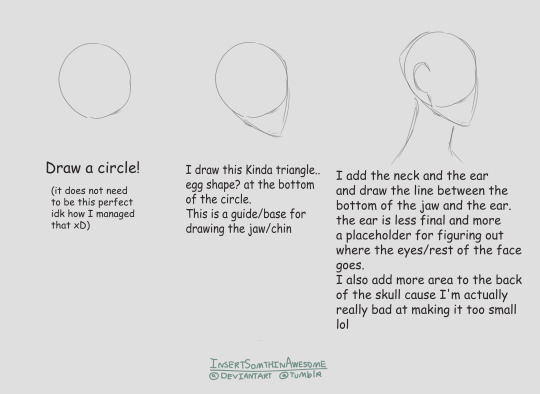

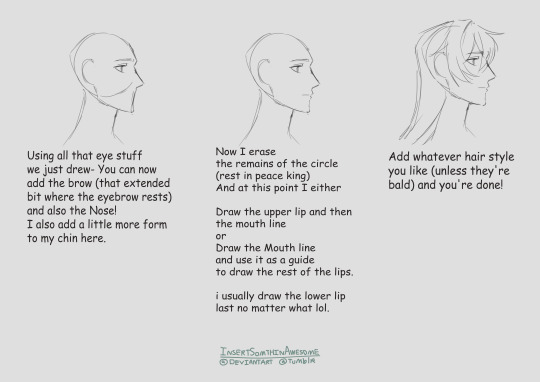
I recorded myself drawing the First image in case that's more helpful than my attempts to explain xD
As for what you were saying about The nose and Mouth being on the same line: I'm imagining what you're talking about is the line starts at the tip of their nose and goes down to their chin? Kinda like some anime styles? My recommendation would be to do what I show above: Draw an egg-ish shape. And the make sure to draw the nose as a Spike/Orb/Whatever shape is your dream desire, popping out of it. Kinda think of it like a mountain in the middle of a flat Plane. Sticking out like a sore thumb. Besides that!!! References are your best friend!! Reference other artists!!! Reference IRL people!! And keep on keeping at it!! Like I said, I used to be TERRIBLE at drawing them, and here I am now :D I'm not always happy with them, and sometimes I still hate how I draw faces (working on that tho) but I'm miles better than when I was a kid. And if I can do it you can do it too :) Best of luck Anon! U got this!!
#isa screams#ask#anonymous#(since this was SUPPOSED TO BE AN ASK DAGNABBIT TUMBLR SLDJFADLKSFJSLDG)#Luocha hsr#tagging he for my own organization mostly. I wave at the people in the tags HAHAHA#Art Tutorial#Tutorial#Video#There is no audio. I thought about just keeping in my sped up audio xD BUt decided against it#drawing tutorial#isa's fanart#December2023#insertsomthinawesome#feels weird to tag this with those tags WHEEZE#i'm still learning how to teach people the things that Are in my head#how do you explain stuff you do on autopilot....#and not cause i'm like. some genius. I've just been doing it forever lol#Its hard man#ALSO HARD TO SPEAK IN LAYMAN TERMS... INSTEAD OF. SUPER ARTIST NERD LANGUAGE WHEEZE
167 notes
·
View notes
Text
Academic Rivals (Wolfstar)
word count: 664
"Ugh, he's speaking Latin, that's so pretentious."
"Remus, you speak Latin," Lily replies, rolling her eyes in exasperation. He ignores her.
"I bet he was born with a silver spoonful of dead languages stuck in his mouth.”
"What a delightful image."
“I hope he chokes on that spoon,” Remus continues, crossing his arms and glaring across the room where James Potter’s thundering laugh echoes from as Sirius Black grins in a way that could rival the sun. Lily scoffs.
"What a prick, no regard for other people's peace and quiet."
"Lily, you have no regard for anyone's peace and quiet." And it's true, she can yell her lungs out when angered.
"Shut up and stop staring at Sirius before he and his annoying best friend come bother us."
"I'm not staring!" Lily grabs her backpack, throwing it over her shoulder just as the bell rings to mark the end of lunch. Her salad is still mostly uneaten next to Remus’ sandwich, both of them having been too wrapped up in conversation to really eat.
"Totally are,” she says back before glaring at James again, who seemed to have developed a sixth sense quick enough to wave at her excitedly at the same time. She picks up her newest book of feminine literature and her half-eaten salad, huffing in irritation at the boy that hasn’t left her alone since he found out she existed. Remus follows her lead, wiping imaginary dust off his uniform as he grabs his Latin textbook, and starts to head to class. From a few tables over, Sirius Black scowls at him but he pretends not to notice.
“Meet up after school?” he asks her, “My mom is baking.”
“Anything for Hope Lupin’s pastries,” she says, winking at him. “Tell me, is she still sure she doesn’t want to run away with me?”
“No, Lily.” Remus clicks his tongue disapprovingly but can’t help but smile at his best friend. “She’s still not accepting your marriage proposals.” Lily sighs.
“A shame, that.” Remus nudges at her as they take a turn in the hallway.
“If you’re that desperate for marriage…” He starts and looks pointedly at her.
“Don’t you dare, Lupin! If I accept a date with James Potter, take me to see a doctor because it will never, ever happen!” She’s almost shouting now as she shakes her fist at him in anger. Remus’ cringes at the weird looks they get from the people around them.
“Alright, alright, pretend I didn’t say anything,” he replies, palms out placatingly. She glowers at him playfully as they enter their classroom, which is less haunted by dead languages than it is the smell of jocks like Sirius Black, who somehow made it to class before them.
Remus sits at his desk, deliberately not looking at the desk that is unfortunately situated right next to him, and waits for class to begin. Professor McGonagall sits at the teacher’ desk, hands clasped together tightly, and dares to smile as she sends Remus to his execution without even a warning.
“For your next project you will be required to translate an excerpt from the writings of Cicero, which I will assign to you in a minute,” she tells the class mercilessly, “And you will work with the person next to you.”
The person next to you. Sirius. Remus almost complains but one look from McGonagall silences him, as if she knew that some people would argue and is ready to smite them at the smallest hint of rebellion. Work with his sworn enemy or face his professor’s disapproving glare. In his peripheral vision he sees Sirius watching him contemplatively, most likely stuck in the same dilemma.
Suddenly, a crumpled note hits him in the face. Remus frowns as it lands on his desk, pretending not to notice before succumbing to his curiosity. He unravels the note cautiously. Who knows what evils could be hidden in this wrinkled piece of notepad paper?
auribus teneo lupum
Remus snorts. Clever.
Meaning 'holding a wolf by its ears' aka being in a dangerous situation where both holding on and letting go could be deadly. Kind of like 'stuck between a rock and a hard place'. Obviously also a play on Remus' last name
#yeah i'm a language nerd what about it#sirius black#remus lupin#james potter#lily evans#wolfstar#jily#my writing#marauders#sirius/remus#academic rivals#the marauders#james/lily
62 notes
·
View notes
Text
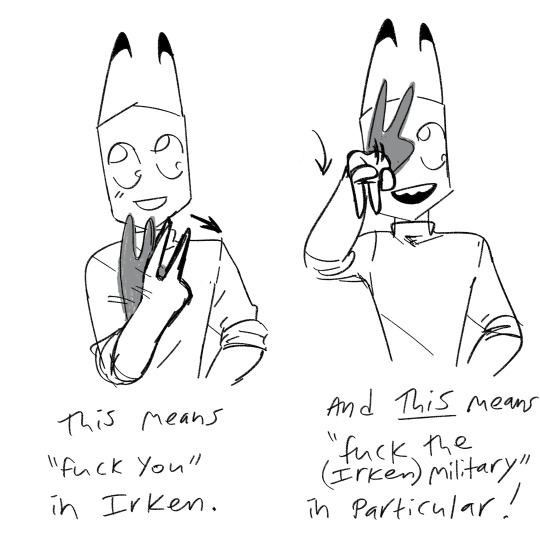
Any gesture that uses just the first 2 fingers is vulgar to Irkens. Zim was very confused by humans doing peace signs for photos or using finger quotes when talking
Doing this sign from the forehead means the Irken military in particular bc of the forehead symbol the elite soldiers have
Editing to add: Irkens would be APALLED to see any of these gestures used- Zim has just been on earth long enough that he doesn't care anymore lmao if he does this in other Irkens' presence they would smack his hand down so fast AND ALSO Zim isn't wearing any gloves?? This makes the gesture even worse!
Part 2
#invader zim#iz zim#Irken lore#Irken language#Irken#my art#Irkens have a thing about hands and feet being covered#feet more so than hands#zim eventually relaxes enough not to wear gloves on earth but going barefoot takes him WAY longer#also also#i give Irkens 3 fingers and a thumb#in the show while zim has 3 fingers total which is one less than humans who have 4 fingers total. So if I give dib 5 I give zim 4#I'm a nerd#I have so many Irken cultural headcanons. gestures. words. you don't wanna get me started lol#fun fact- the reason this gesture is vulgar is bc it vaguely resembles Irken genitalia#much like how the middle finger is bad supposedly bc it represents human male genitalia#the more you know!#am I gonna get in trouble for this? do I need to tag it as something??
121 notes
·
View notes
Text
mein persönlicher Liebling ist ragout fin wie raguh-feng, ein Gericht, von dem ich als Kind ohne Witz jahrelang angenommen habe, es wäre vermutlich chinesisch...
Liebs wenn deutsche pension sagen wie pangsion und chance wie schangse und cousin wie kuseng und rendez-vous wie rangdewu
#aber die anderen Beispiele sind auch nicht schlecht#vor allem 'Grateng'#(schangse ist irgendwie charmant. kann ich nicht erklären ist aber so)#german#i'm a language nerd
478 notes
·
View notes
Text
and now the idea of all the kingdoms in the mario universe having different languages is fresh in my memory
42 notes
·
View notes
Text
I personally headcanon that the only one who can speak Quixian is the acting Quixis because it requires your physical mouth to literally glitch out.
#I have so many thoughts about Quixian as a spoken language#sherbert I don't think you understand what you've done to me#I'm a massive linguistics nerd#and you just threw a literal beep boop language at me#fable smp#Quixian#quixis#sqcu
37 notes
·
View notes
Text
🪷 The Lotus Flower in Mysterious Lotus Casebook 🪷
i. Growing Deep Roots
As noted by difeisheng, Li Xiangyi is an image more than he is a person. He’s the “symbol” and “beating heart” of the Sigu sect; “he embodies everything [the sect] stands for” and “has become one with every person he represents” in his role as a leader. As such, one might say he doesn’t exist as an individual who’s allowed the luxury of flawed, fluid humanity. Rather, he’s fixed into an object: a shield protecting those under his care, a mirror reflecting those he’s taken upon himself to be the champion for.
While a heavy burden to carry, this identity as image is also shown to be brittle, hollow, like a hazy mirage which is more dazzling appearance than substance. Even Fang Duobing introduces Li Xiangyi to Li Lianhua by showing him a painting of his shifu — ink on a page, a person turned into a hero to be worshipped and idolated.
Li Lianhua, over the ten years that pass after the Great Battle of the East Sea, works to plant and cultivate a new identity in the same way one might grow flowers. Li Lianhua forms deep roots and grows out of the mythical hero’s shell he’d been carrying as Li Xiangyi, thus developing an identity which is solid and grounding in contrast — an identity which involves “walk[ing] within a crowd instead of [soaring] above it.”
This shift from image to person is itself rooted in the lotus mantra (written by Buddhist Layman Pang during the Tang Dynasty) which Li Xiangyi first encounters after monk Wu Liao rescues him:
一念心清净 莲花处处开
The heart attains peace with a single thought; Lotus flowers bloom all around.
Although the exact timeline is left to interpretation, it’s implied that the lotus mantra operates as a catalyst of change for Li Xiangyi and that he changes his name to Li Lianhua after reading it. Now what is it about it that speaks to Li Xiangyi so deeply in that moment? As noted in 《 人間福報 》, the lotus mantra teaches us that a pure heart will result in an open and enlightened mind. One subtle, profound thought rife with compassion is enough for a person to glimpse Buddha in a flower, a leaf, a grain of sand or a speck of dust. In short, “if you can find peace within yourself, then you will find peace everywhere.” Perhaps Li Xiangyi, at his lowest point, finds solace in the prospect of stripping his life down to its very core and searching for purity, wisdom and peace within his troubled heart.
By renaming himself 莲花/liánhuā lotus flower, Li Lianhua takes his destiny into his own hands; he empowers himself into reshaping his identity and laying down the foundations for the person he wants to become. Similarly to The Yin-Yang Master: Dream of Eternity which tells us that “names are the shortest spells in the world,” Li Lianhua’s new name functions as a spell which speaks a new him into existence. It’s a deliberate choice, a conscious attempt at breaking free from the suffocating shell Li Xiangyi was trapped in and become a person of his own choosing.
The act of (re)naming notably also extends to Li Lianhua’s abode which he dubs 莲花楼 “Lotus Tower.” In addition to this significant choice of name, it’s interesting to note that Li Lianhua starts growing vegetables inside Lotus Tower when he’s left with nothing after his demise at the East Sea and is facing starvation. As such, his home is quite literally a site not only of self-sustenance and survival, but also of growth — a growth which requires hard work, patience and faith and nearly brings Li Lianhua to tears when his hopes are finally rewarded and the seeds he planted begin sprouting. The act of physically planting vegetables and learning to cook those vegetables speaks of a refreshing and grounding simplicity — of something disarmingly vulnerable and human after playing the role of a god-like figure. Li Lianhua has sweat on his brow and hope in his heart; he plants seeds, watches them grow and keeps himself alive by his own hands.
It seems it’s not only Li Lianhus’a home, but also his very person, which steadily grow into a lotus flower. Li Lianhua wears a variety of hairpins directly linked to the lotus, and the colour coding of his garments moves from the red he used to wear as Li Xiangyi to a lighter palette filled with greens and blues — colours which are more obviously linked to nature.
ii. Life Borrowed and Given Away
The lotus, both traditionally and within the drama itself, is closely connected to the theme of rebirth. On a literal level, the exotic lotus flowers of Cai Lian Manor grow directly from the corpses of the victims drowned in the pond, thus embodying life born from death. thawrecka writes in their story that Li Lianhua is “nothing but a lotus nurtured by a walking corpse, a body that doesn’t realise it should already be dead.” On a figurative level, the lotus grows in muddy water but blooms unsullied every morning, thus symbolising rising from a dark place and growing into something beautiful and colourful despite all the odds. The different stages of the lotus’ blooming can be taken to represent the beginning, middle and end of a spiritual path in Buddhism — a parallel to the theme of 趟/tāng taking a journey which underscores the drama in various ways.
Li Lianhua’s journey, more specifically, is that of a lotus being reborn. The soundtrack piece 《 一壶莲花醉 》 “A Pot of Lotus Wine” emphasises this connection in the following lines:
问一句莲花的悲喜 断一柄弃剑入青泥
I ask about the joys and sorrows of the lotus; A broken, abandoned sword is thrown into the mud.
Not only does Li Lianhua keep stressing at different points of the drama that Li Xiangyi is dead and all that is left behind is Li Lianhua; he even breaks his own sword Shaoshi at the end of the story, thereby physically reenacting a process of destruction—death—and rebirth. As Li Lianhua writes in his farewell letter:
剑断人亡
My sword is broken, and I will be gone.
The significance of Li Lianhua’s action is further intensified here by the fact that the sword in the song is said to be thrown into 泥/ní mud, the site from which a lotus flower grows.
Considering that Shaoshi operates as a device embodying Li Lianhua’s character development throughout the drama, the fact that Li Lianhua decides to break it in the last episode should be taken as a key moment in which he chooses how his own narrative is going to end. Li Lianhua decides to kill for good the glorious image of Li Xiangyi which has become sullied with pain and regret in his heart, so that a simple, fragile peace can begin growing in its place like a lotus flower amidst the mud.
However, the tragedy of Li Lianhua’s narrative is that the rebirth he works to achieve for all these years is not his own to enjoy and never was intended to be. After the Great Battle of the East Sea, as Li Lianhua is reborn from Li Xiangyi and starts planting seeds all around him, he has already accepted that he’s nothing but a ghost, “wandering in the jianghu to close his loose ends and finally [...] vanish without a trace, not even a body left behind.” As mx-myth remarks, even the shift in his garment colours to an overwhelming amount of white as the story progresses makes it clear that he’s resigned to go and has “already started dressing for his own funeral.”
The lotus flower symbolism permeating the narrative accentuates this bone-deep, unshakable resignation. While imprisoned by Jiao Liqiao, Li Lianhua is full of an aching, bittersweet fatalism when he recites a section of Guan Hanqing’s《 窦娥冤 》“The Injustice to Dou E”:
花有重开日 人无再少年 不须长富贵 安乐是神仙
Flowers will blossom again, But a man can never be young again. Seek not eternal wealth; You only need to be content.
Independently from the original meaning of the lines written by Guan Hanqing, the words seem to take on a sad, wistful quality when spoken with a bitter smile by Li Lianhua. In this scene, while the speaker reflects that rebirth occurs outside of themselves in flowers, they acknowledge that their own reality is one inevitably bound to end in old age and decay. Instead of looking forward to a bright future, the speaker doesn’t express any dreams nor ambitions and is only grateful that they’re alive this minute, this second, without any future prospects awaiting them. Perhaps a similar sentiment is reflected in the following lines from 《 一壶莲花醉 》 “A Pot of Lotus Wine”:
了了心事只 不负众生 而已
After settling my worries, I just want to live up to all sentient beings.
Li Lianhua’s connection to the lotus flower, in fact, was always meant to be one of non-attachment. While Buddhism believes desire to be the root of all suffering, the lotus symbolises non-attachment due to being “rooted in mud (attachment and desire)” while “its flowers blossom on long stalks unsullied by the mud below.” This explains in part why the lotus is considered pure and noble. For Li Lianhua, this non-attachment takes on sorrowful connotations: it means that he stubbornly refuses to reap the seeds he sows and focuses his purest heart and will into ensuring those around him get to reap them instead. Non-attachment means allowing himself enough (a roof over his head, food on his plate) to survive, but rarely letting himself indulge in the precious luxuries of reciprocated love and care — of carefree joy and thirst for adventure.
The ten years he lives after his first death at the East Sea are, for him, only borrowed time he didn’t deserve — borrowed time not dedicated to himself, but rather dedicated to others.
In many ways, Li Lianhua’s path effectively goes full-circle by the end of the narrative. When he and Di Feisheng reminisce about the moon they remember from ten years ago, they conclude that today’s moon isn’t any brighter than the one alive in their memory: rather, it remains constant, unchanged, as though the past ten years never existed as anything other than a short pause in the story, a coma, long enough for wrongs to be righted but not for an already-dead person’s fate to be changed.
It’s interesting and particularly significant that the Styx flower (忘川花, from 忘川 “River of Forgetting” in the original Mandarin) is said throughout the drama to be the only thing capable of saving Li Lianhua’s life. In traditional Chinese culture, the Styx or River of Forgetting is part of the process of reincarnation; only by crossing it (and forgetting everything they’ve ever experienced and everyone they’ve ever loved) can a person finally reincarnate. For Li Lianhua, salvation through rebirth comes at a high cost — a price he’s evidently been ready to pay since the beginning, even if it means turning him into a ghost who must vanish from the story in order for those around him to grow and thrive further.
When Li Lianhua breaks his own sword to allow for rebirth, it’s not himself he’s saving. His sole purpose throughout his journey as Li Lianhua is to use whatever meagre strength he has left, whatever passion and drive are still alive in him, to save the world in any small ways that he can. He becomes a doctor who heals people; he looks for answers and solves mysteries to atone for the sins he thinks he has committed and rectify the mistakes he thinks he has made, so that those he has hurt can finally find peace and comfort.
The most powerful legacy Li Lianhua intends to leave behind by the end of the story has nothing to do with himself and everything to do with the people around him who he never truly admits he loves — the messy, imperfect world that’s caused him so much pain but that he nevertheless insists on saving with everything he has.
Most strikingly, Li Lianhua chooses—whether consciously or not—to leave the life and future he’s renounced for himself to his companions Fang Duobing and Di Feisheng. The only traces he purposefully leaves behind live in them: in the Yangzhouman coursing through Fang Duobing’s body; the home, dog and recipe book he passes onto him; the worthy opponent he leaves for Di Feisheng to fight in his stead after he’s gone…
Fang Duobing, by the end of the story, has grown into more than a disciple and a friend to Li Xiangyi/Li Lianhua: he himself has become the lotus flower bringing renewed life after Li Lianhua has left the narrative, thereby taking Li Lianhua’s legacy into a hopeful, vibrant future. As mx-myth mentions in their colour analysis, Fang Duobing notably wears bright pastel tones including a large amount of green/blue — a colour coding which emphasises Fang Duobing’s connection to spring and, by extension, new life and beginnings. “Life will always go on if there’s spring”; and so Fang Duobing’s youth, vitality and optimism can grow in the empty space left behind by Li Lianhua after he fades into the autumn of his life.
While Li Lianhua’s predominantly light colour palette might appear to align him with other characters in the drama who have left the past behind and are looking towards the future, Li Lianhua made peace long ago with the knowledge that he’s destined not to belong in that future. Just as the Lotus Sutra teaches us that “the inner determination of an individual has great transformative power” and “gives ultimate expression to the infinite potential and dignity inherent in each human life,” Li Lianhua focuses all his transformative efforts on creating a future which, despite having no place for him, will be fertile ground for the entire martial arts world to grow deep, healthy roots. In Li Lianhua’s own words:
幼芽生枝 新木长成 武林也一样 这未来如何 谁又能说得清楚呢
The young sprouts and the new trees grow. The martial arts world is the same. What does the future hold? Who can say clearly?
Should we say, then, that Li Lianhua’s story is one of sacrifice, self-renunciation and resignation — of drifting inevitably towards death as a flower carried by a stream? As he disappears on a boat and is asked where he’s going, Li Lianhua gives a response which echoes his first death at the East Sea in a way that feels entirely deliberate:
小舟从此逝, 江海寄余生
From now on I would vanish with my little boat; For the rest of my life on the sea I would float.
How are we to understand a person being reborn simply so they can pass on that new life to others, and being convinced that their only true value lies in their death?
Perhaps, in spite of it all, we can find some small comfort in the knowledge that, no matter how sorrowful Li Lianhua’s fate, it’s at least one that he chooses — one that he has full control over, even poisoned and robbed of his life force as he is. As the lyrics of 《 一壶莲花醉 》 “A Pot of Lotus Wine” underline, “it’s just a matter of picking an ending that you like.” Perhaps that’s all that truly matters.
wuxia-vanlifer makes an excellent point when asking: “What would be more tragic? That he never believed he was loved? Or that he did, but vanished anyway?” While I don’t have an answer to offer, there’s one thing I can say. Li Xiangyi, Li Lianhua — they live and die by love. They can’t conceive of themselves as anything other than a sacrificial tool because, for all that they pretend to be aloof and untethered, they actually love others—and the world—in a bone-deep, profound way they’ve never loved themselves. That love is not only the true driving force behind Li Lianhua’s character and the fate he chooses: it’s the beating heart of the entire drama.
“In this life, I have loved and I have been loved. That is enough.”
Shoutout to the following authors and bloggers whose brilliant words and ideas inspire me, as well as this gorgeous video 💖
ao3: @extraordinarilyextreme @thawrecka
tumblr: @difeisheng @extraordinarilyextreme @mx-myth @wuxia-vanlifer @xinyuehui
#mysterious lotus casebook#莲花楼#li lianhua#li xiangyi#cheng yi#fang duobing#di feisheng#it's sad nerd hours lmao 💕 now we can all suffer together 😘#i'd apologise for shamelessly referencing yym every chance i get even when it's barely relevant but.... well i won't 😌💅#also - please tell me if you notice errors or inconsistencies in any of my points ✨#although i'm always very thorough with my research i don't have a native person's knowledge of chinese language and culture#no doubt i'll think of lots of changes and additions i want to make once this is out there ssdhds 🥴 why is publishing anything so hard??#text: mysterious lotus casebook
99 notes
·
View notes
Text
Haven't seen anyone mention these on here so:
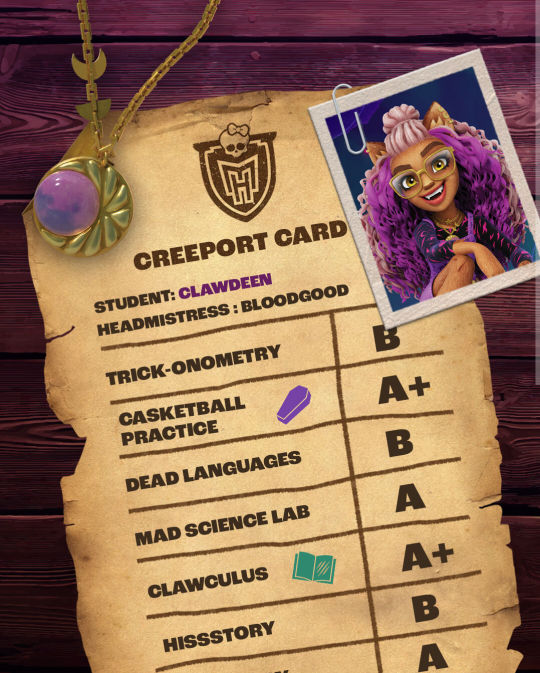
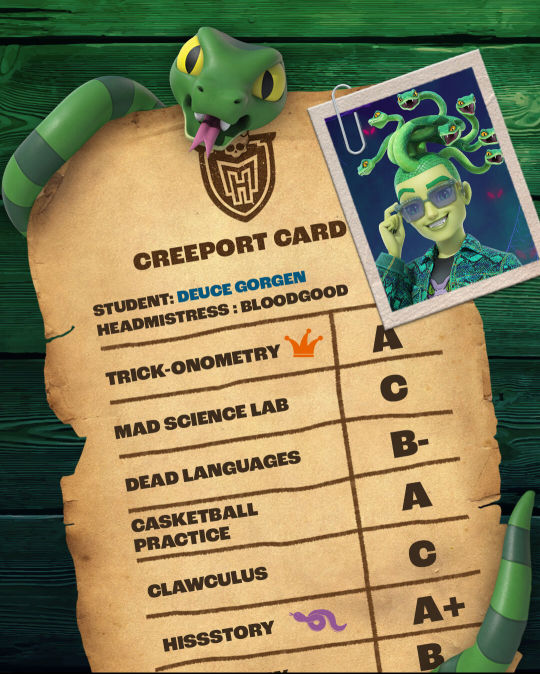
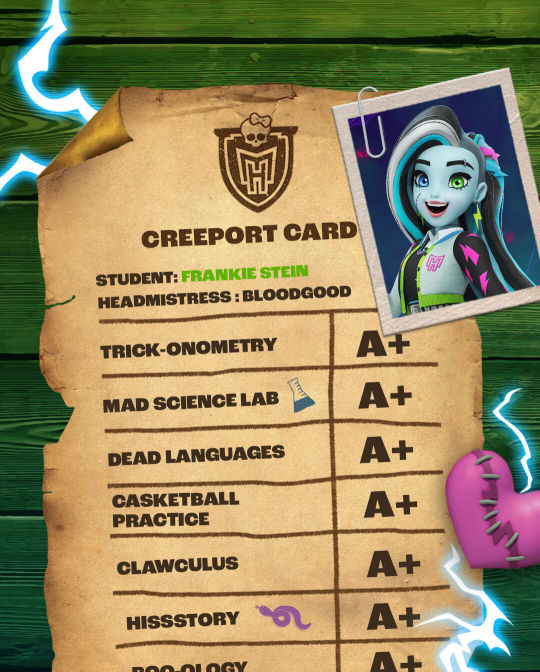
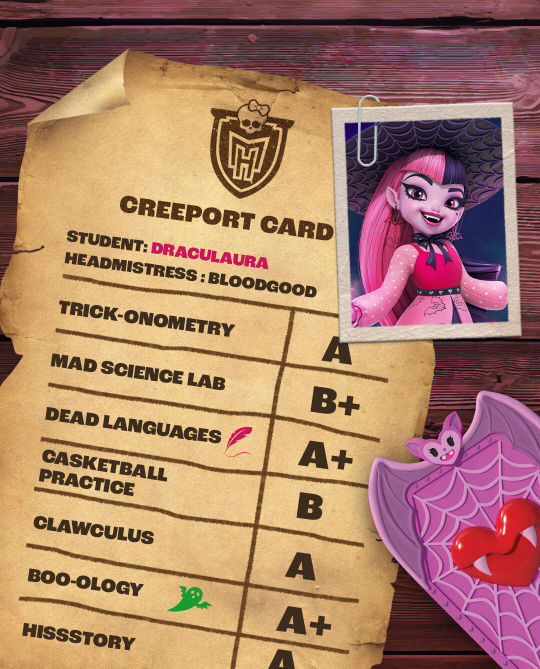
From the Nickelodeon UK instagram account btw.
#where's the bad at school rep.#buncha nerds (jk)#what I'm gathering is Deuce isn't the best at math; Clawdeen is quite good at math; Frankie's brain is beyond my comprehension#and Draculaura “struggles” with science class specifically which is a neat detail#the A+ in dead languages is neat cause shea fontana did mention her speaking a bunch of languages#but why is Frankie good at casketball too. since when are they sporty#everyone except Drac has an A in that pfff#and it's boo-ology now? instead of bite-ology? ok#monster high#monster high g3#rätposting#wait did they give Deuce an A+ in history because of the snake word play gjdjsj
165 notes
·
View notes